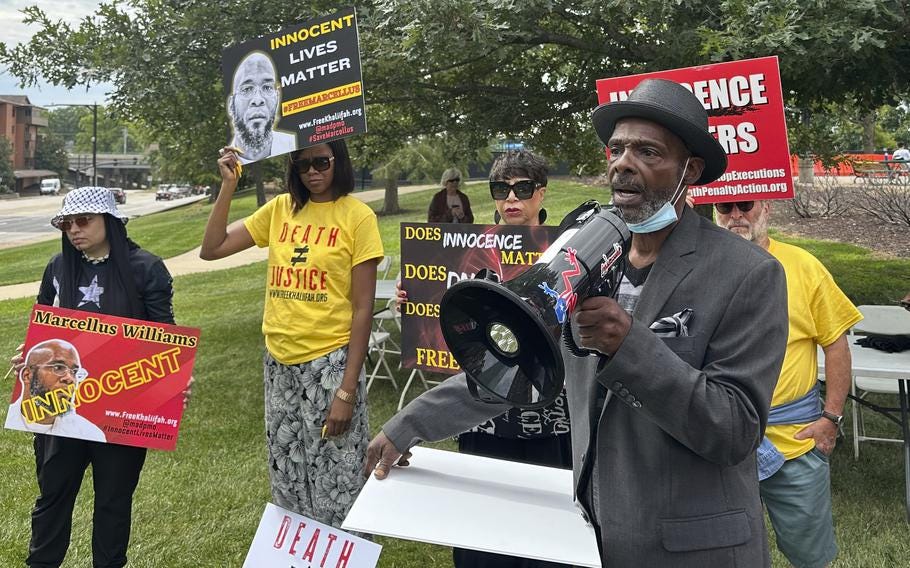The Civic Literacy Conversation That Was Missing From The Recent Marcellus Williams Execution
B|E Brief
This week there was quite a bit of outrage expressed by activists, some policymakers and citizens alike over the scheduled state execution of convicted murderer Marcellus Williams. As reported, Williams was imprisoned for the brutal murder of social worker and former St. Louis Post-Dispatch reporter Lisha Gayle in 1998. Reports the Associated Press …
With the end of his life approaching, Missouri death row inmate Marcellus Williams was offered an opportunity to make a final statement to the world.
His words were few — neither proclaiming innocence nor admitting guilt in the 1998 murder of Lisha Gayle, a social worker and former St. Louis Post-Dispatch reporter who was stabbed 43 times during a burglary of her suburban St. Louis home. Williams instead seemed to express peace with his fate, writing simply: “All Praise Be To Allah In Every Situation!!!”
Williams’ execution Tuesday has left others to debate whether it should have occurred.
The larger story here is not so much the execution itself. It’s the public conversation around it. Between the sequence of legal steps that took place leading up to his execution and the public anger that followed, this latest episode - with Williams story as a sort of social media cause celebre - is a major example of the state of civic literacy in America … or the woeful lack thereof.
Many commentators reasonably argued that Williams or a person faced with his circumstances could have been saved from execution had people just voted on a consistent basis or mobilized and voted in maximum fashion when those opportunities arise - adding that we should all make sure we’re preparing to vote in this election, as well. There was immediate backlash to that sentiment …
But, why the backlash? Where did the public discourse attempt to connect the dots? The St. Louis District Attorney who prosecuted Williams is an elected official, in a city that’s now nearly 45 percent Black. And there are questions still lingering over the way the DA at that time handled that case. Trial judges, such as the one presiding over Williams’ murder trial, are elected in a state like Missouri - or they are first selected under a non-partisan court plan and then, after one-year, run for their seat. The Missouri State Supreme Court that rejected Williams’ request for a stay of execution is composed of judges who are initially appointed by an elected Governor and then run for retention elections after one year of service …
The Governor of Missouri, currently a Republican, who also rejected Williams a stay of execution is an elected official … picked by voters. This is in Missouri, a politically red state, but still a state with major urban centers like St. Louis and where 14 percent of the population is Black. The United States Supreme Court that wouldn’t give Williams a stay of execution is composed of justices who are nominated by an elected United States President and confirmed by elected United States Senators. That’s the same conservative 6-3 majority Supreme Court that not only refused to give Williams a stay, but also destroyed the essential 1973 Roe v. Wade decision and has created the dangerous anti-reproductive rights environment women face today.
But: imagine if, at the very least, a maximum number of people had voted or voted correctly in 2016 to instead elect Hillary Clinton as President. She would have filled those three Supreme Court vacancies and given us the 6-3 liberal majority needed to keep Roe v. Wade intact … and to have more than likely kept Williams alive. See how the dots connect? Yet, most Americans don’t see it because most Americans don’t understand how government functions or works. Civic literacy is broken. As a 2024 study by the U.S. Chamber of Commerce Foundation found …
The survey finds more than 70% of Americans fail a basic civic literacy quiz on topics like the three branches of government, the number of Supreme Court justices, and other basic functions of our democracy. Just half were able to correctly name the branch of government where bills become laws.
While two thirds of Americans say they studied civics in high school, just 25% say they are “very confident” they could explain how our system of government works.
Only 46% of respondents believe the U.S. is performing well on the vital need to understand our system of government—a gap of 49 percentage points from the 95% who call it important for the nation's success.
One in three did not know there are three branches of government.
More than half did not know the number of members in the House of Representatives.
A July 2024 survey by the American Council of Trustees and Alumni found the same alarming trend …
With so many Americans not knowing how government operates, how are we surprised by the disjointed level of public discourse on such sensitive and important topics? What does this mean in terms of major elections like the one we have coming up?






